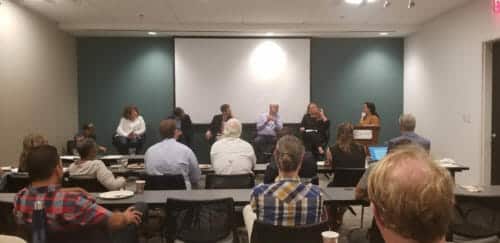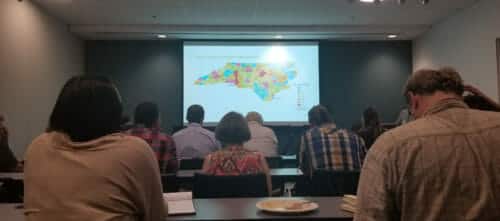NC JOBS & CLIMATE CHANGE
Executive Order 80 – North Carolina Climate Initiative
NC JOBS & CLIMATE CHANGE:
LISTENING SESSION WITH NC DEPT. OF COMMERCE
On Friday, July 19 Chris McCurry joined other business leaders in a panel discussion for Governor Cooper’s charge to the NC Department of Commerce:
“HOW NC CAN GROW JOBS WHILE ADDRESSING CLIMATE CHANGE”
E2 Environmental Entrepreneurs coordinated the listening session. Harmonizing Strategies gathered the panel participants. The panel included:
- Josh Dorfman CEO of The Collider
- Stan Cross CEO of Brightfield Transportation
- Chris McCurry Co-Founder-Owner of Bark House
- Mike Diethelm President of Solfarm Solar Co.
- Steve Linton President of Deltec Homes
- Lauren Rash CEO of Diamond Brand Gear Company
My summary on the conversation is: Important but not adequate. Here’s why:
Climate-System change is not ten years away, it is occurring today. The warming of our planet is causing disruption in normal weather patterns. This is easy to dismiss when we can’t see CO2. However, the number one greenhouse gas is not CO2 it is water vapor, and everyone I speak with is experiencing disruptions in weather patterns with flooding, drought, hail, blizzards and other “unusual” events that occur around water vapor. Everyday activities like a commute to work, gardening (growing food), and outdoor social activities have all been impacted by changes in weather. The good news is that “all human activities have the potential to support the health and wealth of the ecological and social systems they touch” (Regenesis Group). If the listening session left me with any hope, it is that we have the will to make these changes. What I heard from everyone there is that we need high-level initiatives that are capable of reaching back into our communities to create inclusive change. Each individual in the room showed up with a passion for their businesses and community. A cohesive work methodology was emerging from the panel’s and the participant’s interactions. It was a “place-based, living-systems” work model for change. The NC leadership was there to listen, with a plan to work within a multi-departmental approach. The work that occurred in the room was so important, but not adequate because the system we were working in was mechanical.
The big objective is to have a high-level approach formulated to take back to Raleigh to prioritize climate initiatives. In order for individual ideas to be engaged successfully and eventually create collective goals, the system in which this energy for change is working must be capable of supporting systemic change. At the end of the session, I was completely exhausted. Everyone in the room had important insights about their community or their business sector and each had ideas that crossed into other sectors. In the rush of time-limited responses, I was a suffocate in a mechanical process. This is important because the climate is not mechanical – it is a climate-system. I appreciate this administration’s willingness to listen. An issue is that without a process that supports deeper listening, hearing is not possible. I experience that I cannot speak as clearly in an assembly-line approach, either. Climate is not a thing that happens, it is a system-occurring. As such, it is providing us with an opportunity to learn about working with a living-systems approach that would have been structured very differently than the engagement I participated in.
A living-systems approach is focused on learning how to engage with each other and with nature as co-equal partners. It involves developing our awareness, our capabilities, and the potential for life in the places we live and work. This approach requires a higher level of attention on the front end, but is more deliberate, effective, and creates truly healing impacts. A living-systems approach enlivens potential.
Listening is the place to start. Our leadership is listening. The systems of government, healthcare, education, etc. that touch our lives every day have been built using a mechanical model that worked in varying degrees since the industrial revolution. But mechanical things eventually run down. Dabrowski called this process positive disintegration because it is time for them to evolve.
“How would nature think?” Creating living infrastructure will require us to do more than just model our designs after living systems: it will require us to integrate our designs with living systems.
The questions the group was asked to respond to, with my planned responses.
 Q: What can North Carolina do to ensure a workforce with skills for clean energy and clean transportation jobs?
Q: What can North Carolina do to ensure a workforce with skills for clean energy and clean transportation jobs?
A: 40% of North Carolinians live in rural counties. North Carolina is nearly twice as rural as the national average of US states. EO 80 conversations are taking place in Asheville, Charlotte, and Raleigh. Business leaders from these cities can’t represent the rural perspective. Neither trickle-down nor trickle-out economics work, a fact that is extensively documented. As a representative of Rural NC on this panel, I ask that the approach to developing a workforce be a truly inclusive one.
Q: How can North Carolina help meet current & future workforce demand for your sector?
A: North Carolina’s total spending on incentive programs, is currently just 0.15 percent of GDP which places us number 24th in the nation for our business environment. Create incentives programs for companies that demonstrate a significantly lowered carbon footprint. If I could say what I’m really passionate about, then I would share a more holistic response: Provide whole-healthcare for every NC resident that includes preventive health and has no conditions for preexisting diseases. This supports the employee in choosing what type of company they want to work for – and it drives companies to improve practices, not just entice employees in a way that keeps them bound to jobs they hate but can’t leave because of pre-existing health conditions – because a new insurance plan won’t cover them. The current strategy is nothing short of enslaving people to their job – and we know this and this is being supported by an entire system that began in 1942. President Roosevelt broadcast “We shall be compelled to stop workers from moving from one … job to another as a matter of personal preference”. – Give people a real choice and they will choose to work in NC.
 Q: How can NC keep the state’s clean energy & clean transportation sectors growing?
Q: How can NC keep the state’s clean energy & clean transportation sectors growing?
A: Realize that clean energy is not limited to transportation and electricity. With this focus, we are missing the opportunity in the embodied energy used to make building products. Transportation and electricity comprise 39% of the GGE. Agriculture (which includes forestry) produces 24%, manufacturing (which includes the making of all building products) 21% and buildings 6% of greenhouse gases. Given that a built environment the size of NY City is invested in and constructed every month – a huge opportunity is revealed for the making of building products. The nature-based building products manufacturing sector is a huge opportunity for NC to embrace the practice of regenerative development and healthy buildings.
Additional Questions:
Q: What is the biggest challenge facing your sector?
A: The biggest challenge is wrapped up in how each person in this room identifies themselves. Each of us has accepted a label of being called a “consumer”. CONSUMER is defined as an organism that feeds on others. As long as we are comfortable with this false identity – we will lack the will to make the appropriate change.
Q: What skills do you see lacking in today’s workforce?
A: This question asks us to focus on one problem area –skills lacking. It does not ask us to consider workforce/human development as a whole. We are in a world that focuses on problem identification and we think this moves us toward solving them. We attempt to mechanically dissect things as if an alien could chop off our thumb and understand the contribution of that individual part to the development of humanity. No wonder we feel helpless and angry. What if we ask what is the potential for today’s workforce in a system that is capable of understanding and working with whole-constructs and whole-people for a whole-planet? What if our workers had choices to work in whole-businesses? Climate is a whole-systems issue. It will eventually teach us that we must start from a whole-systems model.
For further reading: Embodied Carbon called “The Blindspot of the Buildings Industry”
The Listening Tour details:
NC Jobs & Climate Change: Listening Session With NC Dept. of Commerce
Asheville Area 7/19 11:30 am – 1:30 am @ The Collider
Sign up here: https://bit.ly/2YLF9nr
Charlotte Area 7/22 11:30 am – 1:30 am @ US Whitewater Center
Sign up here: https://bit.ly/2Js3BER
Triangle Area 7/24 11:30 am – 1:30 am @ The RTP Foundation
Sign up here: https://bit.ly/2XFJBYm
